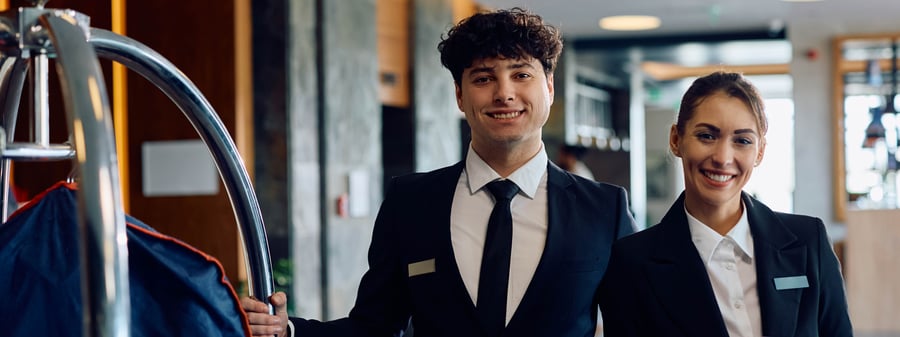Advancing Women in Hospitality: Breaking Barriers and Creating Opportunities
The hospitality industry has long been recognized for its dynamic and diverse workforce. However, despite the significant presence of women in this field, there remains a gender gap, particularly in leadership positions. Advancing women in hospitality is not only a matter of fairness but also a business imperative. Studies show that organizations with gender diversity in leadership outperform their peers in profitability, innovation, and employee satisfaction.
In this blog, we’ll explore the challenges women face in hospitality, the importance of gender equality, and actionable strategies to promote and support women’s advancement in this vibrant industry.
1. Understanding the Gender Gap in Hospitality
Although women make up the majority of the hospitality workforce globally, their representation in senior leadership roles remains disproportionately low. According to McKinsey & Company, only 20% of women in hospitality hold leadership roles, even though they constitute nearly 70% of the overall workforce.
Key Challenges:
- Lack of Female Role Models: The hospitality sector has traditionally been male-dominated in executive positions. A lack of visible female leaders can create barriers for women aspiring to climb the career ladder.
- Work-Life Balance: Hospitality jobs often come with unpredictable hours, high-pressure environments, and extensive travel, which can make it difficult for women, especially those with caregiving responsibilities, to balance work and personal life.
- Gender Bias and Stereotypes: Unconscious bias and stereotypes about gender roles can also hinder women from reaching leadership positions. Women in hospitality are often pigeonholed into certain job functions, such as housekeeping or front office roles, rather than operational or strategic roles that lead to higher-level management positions.
2. The Business Case for Advancing Women in Hospitality
Advancing women in hospitality is not just about promoting diversity for its own sake—it’s good for business. Research consistently shows that organizations with diverse leadership teams perform better financially and foster more innovation. Women bring unique perspectives and skills to the table that can enhance problem-solving and decision-making.
Benefits of Gender Diversity:
- Improved Financial Performance: Companies with more women in senior leadership positions tend to have better financial outcomes. A Harvard Business Review study found that businesses with gender-diverse executive teams were 21% more likely to outperform their competitors in profitability.
- Enhanced Employee Engagement: A workplace that promotes gender equality tends to have higher employee satisfaction and engagement. This leads to lower turnover rates, which is crucial in the hospitality industry where turnover is notoriously high.
- Stronger Customer Connections: Women in leadership often bring a customer-centric approach, helping businesses to better understand and meet the needs of diverse clientele. In hospitality, where guest experience is paramount, having diverse perspectives at the decision-making level can drive greater customer loyalty and satisfaction.
3. Strategies for Advancing Women in Hospitality
To close the gender gap and support the advancement of women in hospitality, organizations must implement intentional policies and initiatives. Below are some key strategies that can help:
3.1. Mentorship and Sponsorship Programs
Mentorship and sponsorship programs are vital for women looking to advance their careers. Mentors provide guidance, share experiences, and offer advice on navigating the industry, while sponsors actively advocate for women’s advancement, opening doors to career-building opportunities.
- Actionable Steps: Implement formal mentorship programs that pair aspiring female leaders with senior executives. Ensure that sponsorship opportunities are available, so women are visible to decision-makers in the company.
3.2. Flexible Work Policies
The hospitality industry’s demanding work schedules can be a deterrent for many women, particularly those with family responsibilities. Offering flexible work options—such as remote work for non-guest-facing roles, flexible hours, and family-friendly policies—can help retain talented women in the workforce.
- Actionable Steps: Introduce policies that promote a healthy work-life balance, such as paid parental leave, childcare support, and flexible scheduling for hospitality roles that allow it.
3.3. Leadership Development Programs
To ensure more women reach leadership positions, companies need to invest in leadership development programs tailored specifically for women. These programs should focus on building critical skills such as negotiation, financial acumen, and strategic decision-making, all of which are essential for leadership roles.
- Actionable Steps: Create targeted leadership development programs that focus on equipping women with the skills and confidence needed for C-suite roles. Encourage participation in industry events and networks that support women’s leadership development.
3.4. Tackling Unconscious Bias
Unconscious bias can negatively impact hiring, promotion, and performance reviews. Hospitality businesses must address bias through education, training, and transparent processes to ensure a fair and equitable work environment for women.
- Actionable Steps: Conduct unconscious bias training for all employees, particularly those in leadership and hiring positions. Implement blind resume reviews and structured interviews to reduce bias in the recruitment process.
3.5. Measuring Progress and Accountability
Establishing clear metrics and goals for gender diversity is essential for driving real change. Companies should track the number of women in leadership positions, measure gender pay equity, and regularly report on progress toward diversity goals.
- Actionable Steps: Set measurable diversity targets for leadership roles and hold leadership accountable for achieving them. Regularly review gender pay gaps and take corrective actions where necessary.
4. Championing Women in Hospitality: Examples of Progress
Many organizations and initiatives are already working to champion women in hospitality and break down barriers to leadership. Below are a few examples of initiatives making an impact:
- Women in Hospitality and Tourism Awards: These awards celebrate the achievements of women who have made significant contributions to the industry. Recognizing and celebrating women’s success encourages more women to aspire to leadership roles.
- Leading Hotels of the World (LHW): This group has been a trailblazer in promoting gender diversity, with a strong commitment to increasing the number of women in leadership roles across its network of luxury hotels.
- She Leads in Hospitality: A global platform that provides leadership development and networking opportunities for women in the hospitality industry, She Leads in Hospitality is helping to shape the future of gender equality in the sector.
Conclusion: A Future Where Women Lead the Way
Advancing women in hospitality is not just a moral imperative but also a strategic one. By fostering gender diversity, businesses can drive innovation, improve financial performance, and create more inclusive environments for both employees and guests. To ensure women continue to progress in the hospitality industry, companies must implement deliberate strategies that promote leadership opportunities, support work-life balance, and tackle unconscious bias.
As more organizations prioritize gender diversity and equity, the future of hospitality will be marked by stronger, more resilient, and innovative leadership teams—driven by the women who lead them.
Talk to our expert team today and start implementing these strategies to optimize your hotel operations and brand growth!

Subscribe to Our Blog
Related posts

The Future of Hospitality Talent: Leveraging AI in Recruiting and Retention



